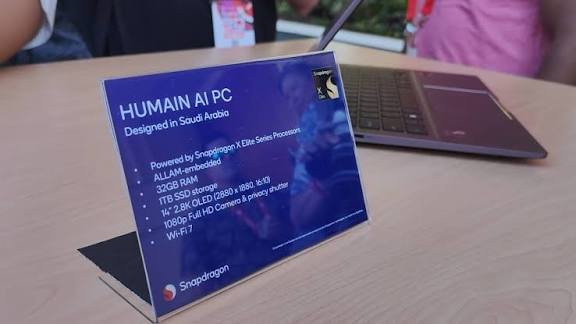When Humain and Qualcomm unveiled the Horizon Pro at Snapdragon Summit 2025, the pitch was bold: an “agentic AI” laptop that brings powerful local AI, an AI-first OS, and long battery life to users who need instant, private intelligence at their fingertips. However, announcements and demos don’t always align with everyday reality. This review cuts through the marketing to evaluate what the Humian Horizon Pro actually promises, where it may shine for real users, and the trade-offs you should know before calling it a must-buy.

What it is — the headline specs and platform
The Humian Horizon Pro is a 14-inch Windows-on-ARM laptop based on the Snapdragon X Elite family, as well as Humian original software stack, Humian One (an AI-centric interface built on Windows on ARM). Humain has two operating modes: full on-device (offline) inference, which is privatizing, and a light-loading mode, which is hybrid. It is announced with a maximum RAM of 32GB, 1TB of SSD, a 2.8K 16:10 OLED display, Wi-Fi 7, a webcam with 1080p, and up to 18 hours of battery life with an exclusive AI key that allows one to directly open the agentic capabilities of the device. These are the main pillars of the product.
Why it is important to you: assuming that you deal with sensitive data, require offline AI (transcription, document summarization, on-device assistants), or experience long unplugged working periods, these design decisions cater directly to these requirements. Another distinguishing feature of HUMAIN is its Arabic-first LLM, called ALLAM, which it includes in the local model stack, a crucial factor for Arabic language users and businesses in the region.
Design, display, and battery — strong on paper
Design, display, and battery -mighty on paper.
Hardware Humain promises to be competitive: its 14-inch 2880×1800 OLED also provides creators and knowledge workers with a healthy variety of usable pixels in a 16:10 proportion, and battery performance (around 18 hours) appears to be on par with other notebooks powered by Snapdragon X Elite. The chassis is metal-looking, and very small, with a display centered on portability without compromising a good display- excellent when you frequently need to draft, annotate, or read a multi-page document, without being at your desk. Initial practical treatment points out instant wake and high responsiveness in case the AI pipeline of the system executes locally.
Real caveat: marketing battery numbers are rarely sustained under heavy AI workloads. If you plan to run continuous local model inference (real-time transcription, continuous agentic tasks, large model runs), expect power draw and thermals to rise—more on that in the performance section.
Performance and AI: instant answers vs heavy lifting
The area where the Horizon Pro can potentially transform the processes is the latency-sensitive AI: fast document summarization, on-the-fly translation, secure voice assistants, and instant context queries that can be leveraged with local models. The demos by Humain focused on these types of agentic tasks and the company is more concerned with the acceleration of these features locally through NPU. It is an obvious victory of privacy-conscious users and field workers who cannot rely on a solid connection.
But even the Snapdragon X Elite, which is as strong as an ARM laptop, is limited in architecture compared to large datacenter GPUs. Even very heavy model training or massive LLM inference will require the hybrid mode of the Horizon Pro (offloading to cloud resources). Summarily: very well to moderately well on device AI; highly intelligent hybrid workflow support; not an alternative to workstation-scale AI systems.
Software and workflow: Humain One and agentic UX
The most radical element of the proposal is Humain One: a more conversational agent-first interface running on Windows on ARM that will restructure the way you use the PC: requests, agents, and workflows rather than icons and files. Humain might decrease the friction of knowledge workers by providing a polished, predictable agent layer that connects with enterprise apps and identity flows. The OS-level agent routing and integrated AI key is a clever UX choice in line with the way user interaction with AI is becoming more and more unified.
However, it is still early: the usefulness of any AI OS will greatly rely on the support of the ecosystem (apps, enterprise connectors, security audits). The compatibility of third-party, enterprise management, and developer tooling will make Humain One a productivity multiplier or a curiosity.
Privacy, security, and enterprise readiness
Humain emphasizes local computing and a mixed paradigm of storing sensitive information by default on a device, which is attractive to regulated industries. The compliance and latency in the local markets are also facilitated by the fact that the company manufactures regionally relevant models (ALLAM). Nevertheless, enterprise purchasers will desire to discover comprehensive security audits, update rate, manageable (MDM backing), and transparent cloud fallback SLAs. Initial reporting indicates that Humain has framed the enterprise but this cannot be fully evaluated without undertaking actual tests and security checks by third parties.
Price, availability, and final verdict
Humain has not released large-scale availability or pricing information; the debut was based on vision and ability, not street prices. That creates some confusion in the minds of customers who decide between this new type of AI PCs and the conventional Windows or ARM rivals. Humain proposes that enterprise and consumer availability will come after they register updates to their site.
Therefore, would you be interested in the Humain Horizon Pro? In the case your daily routine is premised on quick and confidential AI help such as secure document summarization, voice workflows, or enterprise agents, and you appreciate battery durability and size, the Horizon Pro is among the most compelling new items in 2025. It is a plausible move towards realistic on-device AI for actual users.
When, but not otherwise, you require workstation-tiered GPU throughput, no-restrained model training, or a well-developed software ecosystem with long-term developer backing nowadays, you will have to regard the Horizon Pro as an emerging first: promising, but best suited to early adopters and businesses willing to pilot agentic workflows.
Recommended next steps for readers
- If you’re an enterprise buyer: request a pilot, insist on security audits, and test hybrid workflows with your cloud stack.
- If you’re a creator or knowledge worker: watch for independent battery and sustained-load reviews (AI inference tests).
- If you care about regional language performance (Arabic): test ALLAM’s local fluency and privacy controls directly.
Humain’s Horizon Pro is not just another laptop—it’s an experiment in rethinking the PC around agents and local AI. That makes it exciting, but also something to evaluate carefully against your actual workload. For many users, it could be the start of a genuinely faster, more private, and more helpful computing experience.




